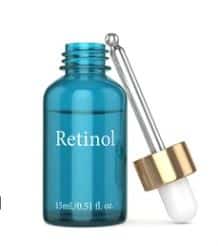You might have heard about different types of Vitamin A discussed in the cosmetic world. Terms such as “retinol, retinoid, retinoic acid”. These are all types of Vitamin A that can play different roles in within our skin’s structure. Generally speaking Vitamin A –containing products accelerate our skin cell turn over; which essentially means they are helping to exfoliate our skin.

These various types of topical vitamin A forms differ in their:
- penetration rates/depths,
- where the vitamin A has been derived from,
- % strength
- Over-the-counter formulation vs doctor-script-only strength
So, which one is the best for cosmetic use?

Well, they are all great for the skin and help improve the effects of aging and many more skin concerns, but the main type of vitamin A we hear about the most is Retinol. This is used topically on the skin and aids in stimulating and regenerating new collagen, as well as regulating oil flow. Meaning it’s great for improving wrinkles, skin texture, dryness, dyspigmentation and over production of oil. This is the POWERHOUSE ingredient that can be used on all skin types, so it’s time to add it into your daily regime!
Sometimes it can be hard to identify which vitamin A to use or which brand is best, as there is SO much information out there. It can be super confusing as the different types of topical vitamin A are not necessarily comparable in terms of formulation. We often get the comment from patients and clients that they are not seeing results using “strong 3% topical vitamin A” and we have to explain that our script only 0.05% vitamin A is more powerful than their 3% over-the-counter cream. We would highly recommend seeking advice from a skin expert, such as a Dermal clinician to gain the best knowledge and understanding about which type of vitamin a would be best for you.
Once you have found the correct topical vitamin A, it’s important to understand how to use it and when to add it into your daily regime. If you’re starting Vitamin A for the first time we would suggest to start on a low percentage and that it should be introduced slowly to the skin to avoid skin irritation. It is best to use Vitamin A topically at night-time as it may cause UV sensitivity. We would recommend using Vitamin A starting off every other night then gradually introducing it every night. If skin irritation occurs Vitamin A use should be reduced back to every other night.

As Vitamin A accelerates our cell turn over, your skin may go through a minor “purging” phase. This means skin may look slightly red, flaking, and mild papules may occur. This shouldn’t be something to worry about as it usually clears up within a couples of weeks. If you experience itchiness, stinging, persistent papules then stop the use of Vitamin A and consult with your skin expert/dermal clinician. It is always important to continue SPF 50+ use whilst using topical retinoids. And also reduce any additional skin irritation (so stop any waxing). Any laser done whilst using topical retinoids needs to be carefully discussed with your laser practitioner prior.
We recommend introducing topical vitamin under the care of a dedicated cosmetics team/cosmetic doctor as they will be able to understand which vitamin A product will work with your existing medications/skin treatments. Dermatologists are able to go one step further and can compound your very own BESPOKE vitamin A skin cream together with other ingredients such as AHAs and skin lightening ingredients (if appropriate) for that EXTRA skin BOOST. A customised experience is best to get the most out of your skin care! Here are some scientific resources for the research-conscious amongst us! https://www.ncbi.nlm.nih.gov/pmc/articles/PMC2699641/ https://www.ncbi.nlm.nih.gov/pmc/articles/PMC6791161/
Here are some scientific resources for the research-conscious amongst us! https://www.ncbi.nlm.nih.gov/pmc/articles/PMC2699641/ https://www.ncbi.nlm.nih.gov/pmc/articles/PMC6791161/
Happy (vitamin A skin care) hunting from the Cosmetics Team @ Hope Dermatology – Jasmina, Hope & Kristie
The post Topical Vitamin A – Does it really work? appeared first on Hope Dermatology.



